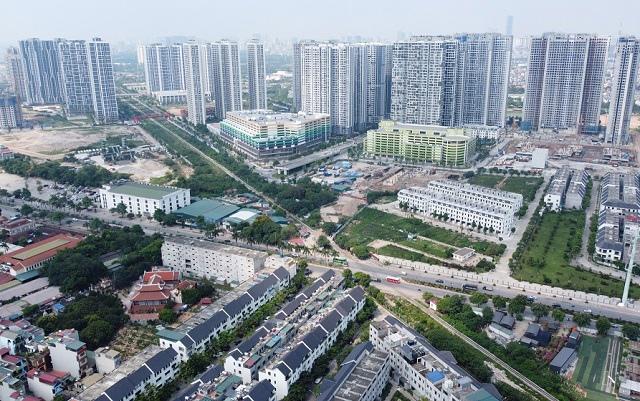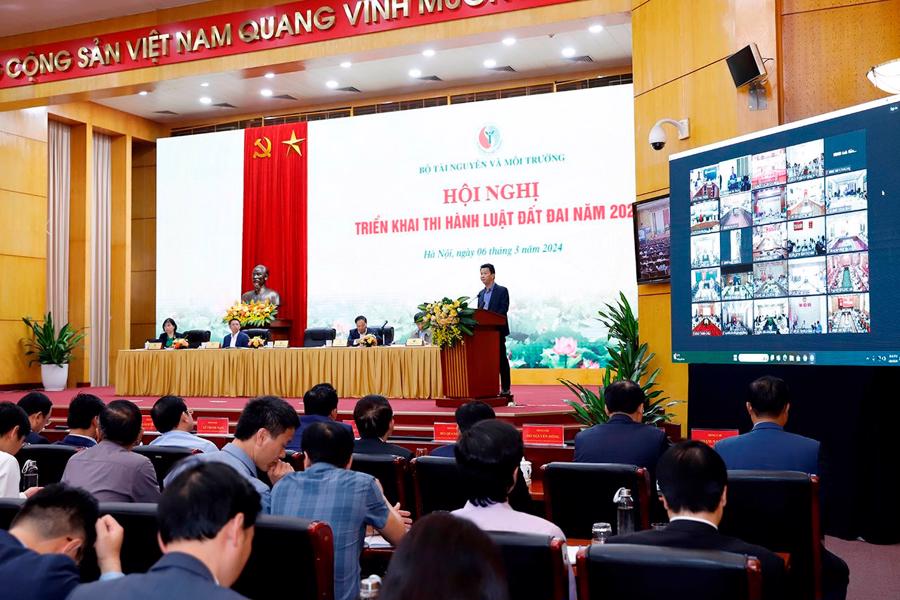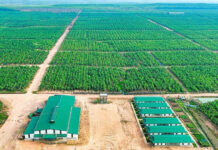On the afternoon of March 6, 2024, the Ministry of Natural Resources and Environment organized a conference to implement the Land Law of 2024. The Land Law (Law No. 31/2024/QH15) was recently passed by the 15th National Assembly during its extraordinary fifth session, consisting of 16 chapters and 260 articles.
This is an important event marking innovations in land policy and legislation in accordance with the spirit of Resolution No. 18-NQ/TW of the Party Central Committee, 13th term, on “Continuing to innovate, improve the system, policies, and enhance the effectiveness of land management and use, creating momentum for our country to become a developed country with high income.”
IMPROVING THE SYSTEM, POLICIES, AND ENHANCING THE EFFECTIVENESS OF LAND MANAGEMENT AND USE
According to Minister of Natural Resources and Environment Dang Quoc Khanh, the Land Law (amended) was passed with many new breakthrough contents contributing to the goal of improving the system, policies, and enhancing the effectiveness of land management and use, including: land planning, land use planning; land recovery, compensation, assistance, resettlement; land transfer, land lease, land use change; land finance, land prices; land registration, issuance of land use rights certificates, ownership rights attached to land; land policies for ethnic minorities;
Along with that, it is necessary to build an information system, a unified land database; promote decentralization, delegation of authority, administrative procedure reform in the field of land, and enhance the responsibility of local authorities at all levels in land management and use…

For more information about the new points of the law, Deputy Minister of Natural Resources and Environment Le Minh Ngan emphasized that the Land Law is an important law that impacts all aspects of the country’s economic, social, defense, security, and environmental protection life; plays a central role in the legal system related to land, which is related to many other regulations.
The policy of building the law aims to fully and timely institutionalize the views and guidelines of the Party in Resolution of the 13th Party Congress, Resolution No. 18-NQ/TW and resolutions, conclusions of the Party on land management and use; ensuring the inheritance, stability, and development of the land law system; amending and supplementing regulations that are not suitable for practice; Ensuring the consistency and uniformity of the land law system with other related laws; improving provisions to manage land by function as resources, assets, and resources in terms of area, quality, and space of use.
The law further strengthens decentralization and delegation while establishing control tools of power for competent agencies and individuals in land management; Enhancing the supervisory role of the National Assembly, People’s Councils, the Vietnam Fatherland Front, and political and social organizations at all levels and the People.
In addition, it strengthens administrative procedure reform; shifting the focus from management through administrative tools to effectively using economic tools to promote rational, effective, and sustainable land use, which is an important perspective in building the law.
To be suited to reality, the law advocates modernizing and digitizing land management based on an information system, unified land data, concentrated, serving multiple objectives connecting from the central to local levels, managing fluctuations in each plot of land.
Also, according to Mr. Ngan, the Land Law of 2024 has new points that are close to Resolution 18 and are concretized, such as land policies for ethnic minorities; adding and regulating the role and responsibilities of the Vietnam Fatherland Front and its member organizations; Supplementing regulations on rights and obligations of citizens regarding land; the choice of public career units; regulations on the transfer of paddy land; conversion of agricultural land use rights; land planning, land use planning; issuance of certificates, land price…
Regarding land finance, the law has a stable land rent policy. Annual land rent is stably applied for a 5-year period from the time the State decides to rent land, permitting land use change associated with switching to the form of the State renting land with annual payment.
The land rent for the next period is calculated based on the land price table of the year determining the next land rent. In case the land rent increases compared to the previous period, the land rent must be adjusted but not exceeding the ratio prescribed by the Government for each stage.
Regarding land valuation methods, the law specifically stipulates the land valuation methods (comparison, income, excess, and land price adjustment factors), and at the same time, assigns the Government to regulate land valuation methods other than the 4 above methods after being agreed by the Standing Committee of the National Assembly; stipulating cases and conditions for applying land valuation methods; cases where land valuation methods are applied to determine specific land prices that are lower than land prices in the Land Price Table then using land prices in the Land Price Table.
BRINGING THE LAW INTO LIFE, MEETING REALITY REQUIREMENTS, RESOLVING LOCAL DIFFICULTIES
With breakthrough new points, localities evaluate that the Land Law of 2024 has closely followed Resolution 18, resolved existing difficulties, and problems when implementing the Land Law of 2013.
According to Deputy Chairman of the Ho Chi Minh City People’s Committee Bui Xuan Cuong, the Land Law has adhered to the system in accordance with Resolution 18, summarized the implementation of the Land Law of 2013 and coordinated with the Real Estate Business Law, the Housing Law as the basis for local implementation.
In the coming time, the city will focus on providing comments on the Draft Decrees guiding the implementation and desire to soon issue the Decrees. The city will soon issue documents according to its authority as stipulated in the Land Law of 2024. The city’s leaders propose that the Ministry promptly organize delegations and training courses for new contents of the law.

On the other hand, Mr. Nguyen Van Son, Chairman of the People’s Committee of Tuyen Quang Province, is confident that the Land Law of 2024 will meet practical requirements, resolve difficulties in localities; At the same time, he proposes to promptly issue the Decrees guiding the implementation of the law for local authorities to implement and ensure consistency.
Sharing the same viewpoints, Deputy Chairman of the Hoa Binh Province People’s Committee Quach Tat Liem expects that the Decrees guiding the implementation of the law need to stipulate specific contents, especially land finance contents, to be transparent, understandable, and easily implemented, and to be issued soon so that the law can enter into life.
On March 5, 2024, the Prime Minister issued a Plan for implementing the Land Law, assigning responsibilities to the Ministry of Natural Resources and Environment, relevant ministries, sectors, and localities in organizing the implementation of the Land Law.
Minister Dang Quoc Khanh proposed that the assigned ministries, sectors, and localities urgently carry out their assigned tasks. In particular, it is necessary to focus on directing the review and issuance of documents according to their authority, building land price lists; issuing land use rights certificates without paperwork; publicizing land planning, land use planning; building and updating land databases; reviewing farm land…
The Ministry of Natural Resources and Environment is assigned to build 6 Decrees and issue 4 Circulars according to their authority. Currently, the Ministry is urgently building Draft Decrees guiding the implementation and collecting opinions from localities for improvement.
Mr. Khanh believes that with the urgent and determined involvement of the Government, ministries, sectors, and localities, the Land Law will soon be put into life, contribute to meeting the requirements of economic and social development, expanding international integration, step by step realizing the goal of the industrialization and modernization of the country; timely respond to the aspirations of the people.





































